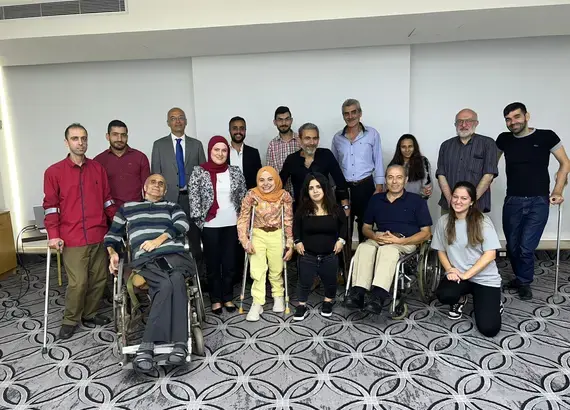
Success Story
The Interdependence of Disability Rights, Political Participation and Democracy
Political participation is key to advancing disability rights and countering discrimination across all political spheres. Inclusive political systems and states can only be achieved if all sectors and segments of the population have equitable, accessible and open space to work together to advance collective priorities. Inclusion can only be accomplished when underrepresented groups have the necessary legislative, environmental, social and procedural measures that allow them to be key influences in the political arena, and exercise their civil and political rights equitably and with dignity.
Persons with disabilities are among several underrepresented groups who experience structural and systematic discrimination and exclusion, often perceived as objects, less valued and passive recipients. This coincides with the fact that persons with disabilities do not enjoy their basic social and economic rights such as access to inclusive education, health, habilitation and rehabilitation, movement, and employment. The situation holds particularly true and is exacerbated in many Arab countries that struggle with political and armed conflicts, occupation, economic disasters and debilitating social structures.
These complexities pose significant questions in relation to political participation and the rights of persons with disabilities, such as:
- When citizens with disabilities are deprived of their basic rights, which are prerequisites to effective political participation, are they capable of perceiving political participation as a priority?
- When basic needs and rights are not met for the majority of citizens, is it possible to put the right of persons with disabilities to political participation on the agenda?
- What is the feasibility of addressing the right of persons with disabilities to political participation as states struggle with armed conflict, economic crises or other emergencies?
Although these questions are well-founded, they reinforce the idea that political participation and the processes relevant to meeting basic needs and navigating crises are mutually exclusive rather than mutually reinforcing. In emergency situations, persons with disabilities are playing and can play essential roles in decision-making processes to ensure humanitarian programs do not leave anyone behind. Having navigated diverse forms of discrimination and barriers, persons with disabilities are experts in innovative approaches to advocacy and creating entry points for engagement, even in times of conflict and transition. Political participation enables persons with disabilities to push for and secure job opportunities, including senior positions allowing them to transform the job market for other communities. The participation of persons with disabilities enhances access to information, reduces barriers within the built environment and creates space for persons with disabilities to strengthen civil society by establishing organizations to promote and sustain disability rights advocacy, community organizing and representation at the district and national levels.
Developing knowledge and skills are key to enhancing the effective political participation of persons with disabilities, alongside facilitating opportunities for planning and implementing advocacy campaigns and strategically engaging decision makers. Accordingly, the Arab Forum for the Rights of Persons with Disabilities (AFRPD), in partnership with NDI, launched an initiative to promote persons with disabilities’ right to political participation in four Arab countries: Lebanon, Libya, Morocco and Tunisia. This initiative consists of several components that seek to support and strengthen the power of AFRPD member organizations to strategically engage decision-makers to advance disability priorities in their respective countries. Support to date has included:
- Research, whereby member organizations strengthened their knowledge and skills on designing and implementing research methodology and tools. Research identified barriers that hinder persons with disabilities’ enjoyment of the right to political participation and provided member organizations with useful data to inform evidenced-based policies;
- Capacity building of member organizations on the right to political participation embodied in international treaties and national legislation, policy development processes, advocacy skills, strategic communications and other necessary topics identified by the organizations;
- Support member organizations to plan and implement advocacy campaigns in their countries, targeting strategic stakeholders such as political parties, politicians, ministers, election management bodies and other disability and human rights organizations.
- Cross-regional sharing sessions, bringing together diverse disability activists and leaders from outside of the Arab region to highlight challenges and exchange lessons learned when engaging decision-makers on disability rights and priorities as well as developing contingency plans to sustain engagement and advocacy in evolving political environments.



